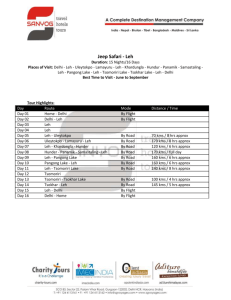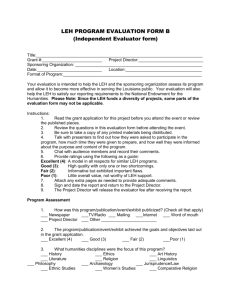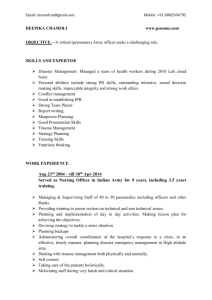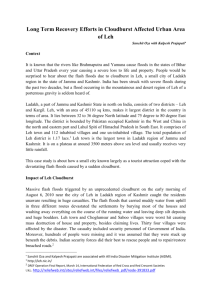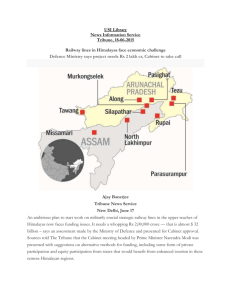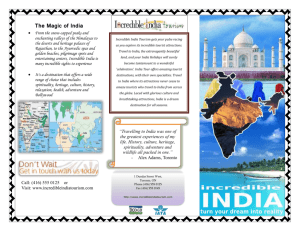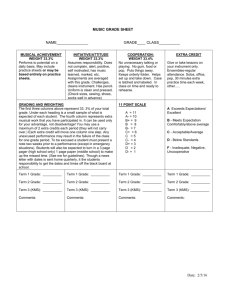Jeep Safari
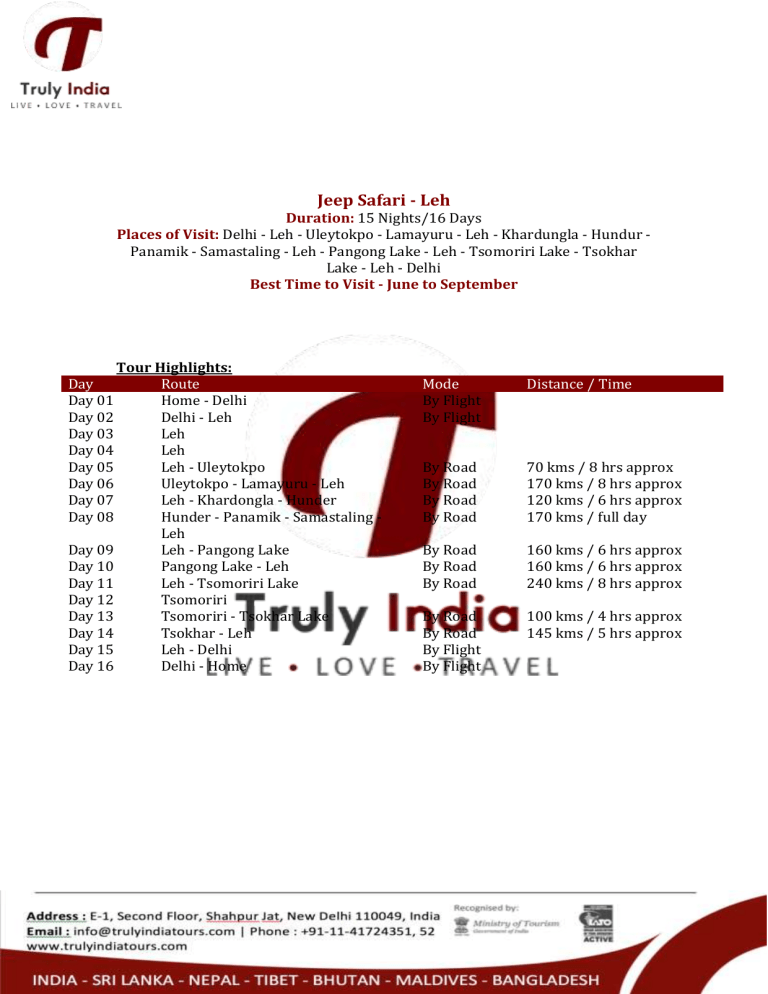
Jeep Safari - Leh
Duration: 15 Nights/16 Days
Places of Visit: Delhi - Leh - Uleytokpo - Lamayuru - Leh - Khardungla - Hundur -
Panamik - Samastaling - Leh - Pangong Lake - Leh - Tsomoriri Lake - Tsokhar
Lake - Leh - Delhi
Best Time to Visit - June to September
Day 11
Day 12
Day 13
Day 14
Day 15
Day 16
Day
Day 01
Day 02
Tour Highlights:
Route
Home - Delhi
Delhi - Leh
Day 03
Day 04
Day 05
Day 06
Day 07
Day 08
Day 09
Day 10
Leh
Leh
Leh - Uleytokpo
Uleytokpo - Lamayuru - Leh
Leh - Khardongla - Hunder
Hunder - Panamik - Samastaling -
Leh
Leh - Pangong Lake
Pangong Lake - Leh
Leh - Tsomoriri Lake
Tsomoriri
Tsomoriri - Tsokhar Lake
Tsokhar - Leh
Leh - Delhi
Delhi - Home
Mode
By Flight
By Flight
By Road
By Road
By Road
By Road
By Road
By Road
By Road
By Road
By Road
By Flight
By Flight
Distance / Time
70 kms / 8 hrs approx
170 kms / 8 hrs approx
120 kms / 6 hrs approx
170 kms / full day
160 kms / 6 hrs approx
160 kms / 6 hrs approx
240 kms / 8 hrs approx
100 kms / 4 hrs approx
145 kms / 5 hrs approx
Inclusions:
Welcome on arrival with fresh flower garlands.
Meet assist at the airport / hotels with our representative.
15 Nights hotels/camps accommodation on DBL /Twin sharing basis.
Meals Plan full board (Breakfast + Lunch + Dinner) (lunches on long excursions/ Ladakh sector would be packed).
Air tickets for Delhi - Leh - Delhi in economy class.
Entrances to places of visit.
Inner line permit.
Services of local guide in Leh & accompanying for other excursions
Transport as per itinerary & sight seeing by Xylo/Scorpio/Innova (4 full paying pax per vehicle, local guide/accompanying guide or escort may be the extra person or 5th person)
Covering all main / major monuments and tourist attractions in each city.
Check in & Check out 12 Noon.
All present Government taxes.
Exclusions:
Any International Flight.
Camera fee / Video fee.
Any expenses of personal nature like table drinks, tips, laundry, portages etc.
Telephone Call / Fax.
Any Donations / Driver Tips.
Any costs arising out of unforeseen circumstances like landslides, road blocks, bad weather etc.
Travel Insurance.
Repatriation charges, damages/ claims of any nature
IMPORTANT INFORMATION
Accommodation in good hotels/camps.
Tours will operate with minimum 02 Pax.
Extension to other places is also possible with a minimal extra cost.
Additional nights are available at each place with minimal supplement.
A visa is required and must be obtained prior to your departure from your Country.
If quoted accommodation is not available, we will provide one of a similar category and standard.
Small deviations in the tour program are sometimes necessary, depending on weather, road conditions, flight schedules and room availability.
In case the government changes presently applicable taxes, increase in
airlines prices, fuel surcharge our rates will need to be adjusted accordingly
In India there is no relevance between the distance and time of travelling, as it depends upon the condition of the roads and congestion of the traffic.
While every effort will be made to maintain the itinerary, in view of local strikes etc that are beyond our control all schedule and itineraries are subject to last moment changes.
Clients must be fully insured, as the company cannot accept liability for loss or damage to client’s property, medical emergencies or any other loss suffered by them whilst on tour.
In case of issuing Domestic or International air tickets, SGV is not responsible for any refund if the flight is delayed or cancelled, as it is the responsibility of airline.
Paragliding, rafting, trekking & high altitude travel are adventure activities and the rates do not cover any insurance, risk cover, damages, claims etc. A person coming on adventure tour has to be covered for adventure travel & activities apart from normal travel insurance. We will not be liable in any case for any mishap/ loss etc.
For journey in Ladakh or for any other high altitude tour a person should be covered under travel insurance and the insurance should also include adventure travel and repatriation by a helicopter. Our tour in Ladakh or any other high altitude travel/ tour do not include any travel insurance/ repatriation charges/ damages/ claims etc incase of any eventuality.
Insurance cover has to be from the guests country of origin only and cannot be done here in India on arrival.
In Leh, the supply of vehicles to any tour operator is controlled by the local transport union. This means that we are allocated such vehicles and their drivers as the union considers appropriate. Due to the restrictions imposed in this area, we are unable to personally source the vehicles or monitor the standards, as is our practice elsewhere in Himachal.
Foreign nationals have all travel documents in original.
There would be only 04 full paying pax per vehicle and the vehicle might have fifth pax who would be accompanying escort or local guide.
Accompanying escort/ guide would not be provided with an additional vehicle even if the jeeps have 4 full paying pax.
Jeep Safari - Leh
Duration: 15 Nights/16 Days
Places of Visit: Delhi - Leh - Uleytokpo - Lamayuru - Leh - Khardungla - Hundur -
Panamik - Samastaling - Leh - Pangong Lake - Leh - Tsomoriri Lake - Tsokhar
Lake - Leh - Delhi
Best Time to Visit - June to September
Day 01 Home - Delhi By Flight
Arrive Delhi, meet and assist on arrival, welcome with fresh flower garlands.
Overnight at hotel.
Day 02 Delhi - Leh By Flight
After early breakfast transfer to airport to board the flight to Leh. Meet & assist on arrival and check in at your hotel. Complete day for the acclimatization. In the evening free to make short walk around the Leh bazaar. Overnight at hotel.
Day 03 Leh
An excursion to famous monasteries of Ladakh. It is interesting to visit early in the morning to enjoy the praying ceremony at Thiksey monastery. Continue drive to Hemis monastery which is one of the most famous monasteries of the
Ladakh region. On the way back visit to Shey Palace. Evening free to explore Leh market on own. Overnight at hotel.
Day 04 Leh
Morning half day tour visiting Spituk and Phyang monasteries. Afternoon a half day tour visiting Leh Palace, Shanti Stupa, Shankar Gompa and Leh Bazar.
Evening a visit to the local Ladakhi family house can be organized on request at an extra cost. Overnight at hotel.
Day 05 Leh - Uleytokpo By Road 70 kms / 8 hrs approx
After Breakfast drive to Uleytokpo enroute visiting Basgo Palace, Liker and Alchi monasteries. Also walk around the village and drive to Uleytokpo. Overnight in camp.
Day 06 Uleytokpo - Lamayuru - Leh By Road 170 kms / 8 hrs approx
After breakfast, checkout from the camp and drive to Lamayuru monastery.
Lamayuru monastery is one of the oldest and spectacularly set founded in 10th century. Afternoon drive back to Leh. On arrival check in and overnight at hotel.
Day 07 Leh - Khardongla - Hunder By Road 120 kms / 6 hrs approx
Travel by surface from Leh to hunder enroute visiting Khardongla pass, which is the highest motorable pass in the world 5600 m and has been recorded in the
Guinness Book of World Records. Continue drive to Deskit visiting the Gompa and then further to Hunder. On arrival check in at camp. In the evening visit the sand dunes and optional bactirian camel ride. Overnight in camp.
Day
08
Hunder - Panamik - Samastaling - Leh By
Road
170 kms / full day
Travel by surface from Hunder to Leh enroute visiting hot springs at Panamik and Samastaling monastery. Later drive back to Leh/. On arrival check in and overnight at hotel.
Day 09 Leh - Pangong Lake By Road 160 kms / 6 hrs approx
After Breakfast leave for Pangong Lake14, 500 ft, through Changla Pass 17,350 ft.
Third Highest Motorable road in the world. On arrival check in and overnight at camp.
Day 10 Pangong Lake - Leh By Road 160 kms / 6 hrs approx
After Breakfast visit Pangong Lake, A Highest Salt Water Lake in the World,
Shared by two countries India (25%) & China (75%), Enjoy the beauty of lake on
Banks of the Lake while appreciating the changing colours of fascinating high
Altitude Lake. Return back to Leh. Overnight at hotel in Leh.
Day 11 Leh - Tsomoriri Lake By Road 240 kms / 8 hrs approx
Today we take you on a 4 day tour to the Rupshu region of Ladakh which is famous of its nomadic shepards. Travel by surface from Leh to Tsomoriri. On arrival check in and overnight at camp.
Day 12 Tsomoriri Lake
A day to visit Tsomoriri lake, walk around the beautiful lake, visit Karzok village on banks of the lake and the village monastery. Overnight at camp.
Day 13 Tsomoriri - Tsokhar Lake By Road 100 kms / 4 hrs approx
Travel by surface from Tsomoriri to yet another salt lake of this region. On arrival check in at camp. Rest of the day free to explore the region, make walks around the camp or visit the remote Tsokhar village. Overnight at camp.
Day 14 Tsokhar - Leh By Road 145 kms / 5 hrs approx
Travel by surface from Tsokhar to Leh crossing over Tanglangla (5360 m) which is the second highest motorable pass. On arrival check in at hotel. Rest of day free for independent activities. Overnight at hotel.
Day 15 Leh - Delhi By Flight
After breakfast transfer to airport to board the flight to Delhi. Meet and assist on arrival and transfer to hotel.
Day free to relax and personal activities. Overnight at hotel.
Day 16 Delhi - Home By Flight
Early morning transfer to airport to board the flight to fly back home.
Know before you go
Language
While English is not the first language in India, it is the most important language for national, Hindi is the national language and primary tongue of 30% of the people and there are 14 other official languages, including: Bengali, Telugu,
Marathi, Tamil, Urdu, Gujarati, Malayalam, Kannada, Oriya, Punjabi, Assamese, Kashmiri, Sindhi, and Sanskrit. Hindustani is a popular variant of Hindi/ Urdu spoken widely throughout northern India but is not an official language.
Taxis & Rickshaws
Taxis are cheap and readily available in most of the bigger towns in India. Most of them possess metres, although taxi drivers who actually use their metre are rare! Try and get an idea of the likely fare before you leave your hotel. The front desk staff or your tour guide should be able to assist you. Then negotiate with the driver before departure. Motorised three-wheel rickshaws are available for hire throughout the country. Powered by a 2-stroke motorcycle engine with a driver upfront and seating for 2 - 3 at the rear, with no doors and a canvas roof, these rickshaws weave their way speedily through oncoming traffic. The ride will be fast, efficient and certainly an experience! Always negotiate the price you want to pay before setting off. Offering around 50% of the asking price is the general rule of thumb, though you’ll always pay more than the going rate for a local! A cycle rickshaw is a 3-wheeler bicycle with a seat for passengers behind the rider.
Although not often seen in big cities, you’ll find them in Old Delhi and all the smaller towns, where they are a common mode of transport. Again, negotiate the fare before departure.
Religion
More than 80% of the country practice Hinduism. The remaining 20% comprise followers of Islam (12%), Christianity,
Sikhism, Jainism, Buddhism and other minority beliefs.
Not like Home
Travelling to far–flung corners of the earth often involves encountering lifestyles and conditions that are very different from what you are used to back home. As such it is important to come prepared for unusual situations, local inadequacies and unpredictable events as and when they occur. The people, customs, creed and languages of India are different from one region to the next. It is as vast as it is crowded, and as opulent as it is squalid. India is exciting, intense and diverse - an all-embracing experience, a veritable assault on the senses. Sometimes the poverty will get you down, Indian bureaucracy can test your patience and facing another traffic jam will seem almost too much to bear. Yet, it’s all worthwhile. While India is far from the easiest country in the world to travel around, Truly India will try their best to make your tour as seamless as possible. Our holidays combine comfortable transportation, comprehensive sightseeing and good hotels, allowing you to concentrate on getting the most out of your stay. India is a country of unparalleled contrasts, a destination where you’ll be afforded plenty of unique encounters, and if you can travel with an open mind you will have a wonderful time here.In return, please remember to demonstrate sensitivity and respect for local customs.
Tipping Kitty
Tipping is not a natural part of many Western cultures and many of us feel uncomfortable, or unsure about when or how much to tip. However in India tipping makes up a significant part of many people’s wages so it’s important that we get it right.
Visas
All foreign nationals must obtain a visa for a visit to India and it is essential the visa be procured prior to travel.
Information about the e-Tourist Visa (eTV) process can be found at: https:// indianvisaonline.gov.in/visa/tvoa.html The online application should be submitted a minimum of 4 days and a maximum of 30 days in advance of proposed date of arrival. Entry to India must be within 30 days of the eTV approval date and the visa is valid for 30 days from arrival.
Please visit the website noted above for more info. If you are planning to visit a neighbouring country such as Nepal,
Bhutan or Sri Lanka and return to India you will require a multiple entry visa which must be procured in advance of travel. In order to obtain this, you will need to provide the embassy with a detailed itinerary and full flight information, showing the dates and ports of exit and re-entry to India. If you are a resident in the UK we offer a visa service to save you the inconvenience of having to queue at the embassy, please visit our website or contact us for further information. Visa requirements are subject to change and that visa procurement prior to departure is solely the responsibility of the traveller and not of Truly India Tours. Please also ensure that your passport is valid for at least 6 months from your planned date of return from India.
Currency
The currency of India is the Indian Rupee Pound Sterling, US Dollars or other major currencies can be exchanged only in
India, as the Rupee is presently exchangeable only in destination. The Rupee is non-exportable, so spend it all before you leave! Exchange facilities are available at major airports and bureau de changes and to a lesser degree, ATMs/cash machines exist in larger towns. It's advisable to request bank notes in smaller denominations, as it can sometimes be hard to get change from large notes and smaller notes are handy for smaller purchases and gratuities. Traveller's Cheques are not recommended as they're often difficult to exchange and incur high fees.
Domestic Flights - Baggage Allowance
If your tour includes a domestic flight or you have independently booked domestic flights separate to that of your international flights, please be mindful that that free baggage allowance for Economy class travel on all flights within
India is 15kg with 7kg of hand luggage. TOP TIP: Before leaving home inform your bank that you will be travelling to
India, as otherwise your bank may think that your transaction made in India is fraudulent and withhold funds until you contact them.
Water
As tap water is not safe to drink in India, only drink bottled mineral water which is readily available in hotels, shops and restaurants.
Climate
India has a three-season year known as the hot, the wet and the cool. The best time to visit is between September and
April when temperatures are cooler and therefore ideal for sightseeing. In the summer months of May to July it is less crowded and conditions are perfect for sightseeing and photography, although parts of India are extremely hot. July signals the start of the monsoon or wet season that continues until early September. Although the weather is humid, the days are punctuated by intermittent rainfall and the monsoon is India is actually quite spectacular and refreshing.
Time & Voltage
India is 5 hours 30 mins ahead of GMT. Standard voltage is 230-240V (usually 240V). Pack a universal travel adaptor that will allow you to use a hairdryer, electric shaver, charge a mobile phone and other electrical items. Take care with your choice of adaptor. Be sure that it is suitable for India, as Indian sockets accept round 3 pin plugs that are similar but not identical to European plugs.
Essential Packing
• A small daypack for your day-to-day needs.
• A photocopy of your passport data pages.
• The voltage in India is 230-240V. Most outlets in India accept round 3 pin plugs (not a UK, European or USA plugs). You should pack a Universal Adaptor and check that it is suitable for India.
• Insect repellant to guard against mosquitos.
• Spare camera batteries/memory card.
• Consider packing some pencils, pens or modest educational supplies that can be given to village schools or street children.
• Buy some Indian Rupees at the airport on arrival.
